Product Category

Tianhong Story

Organic Bamboo Pioneers
We are dedicated to creating more than 90% organic products by 2030, and we are one of the first manufacturers in the world to adopt the organic bamboo OCS label.

Environmental-Friendly
We adhere to the OEKO-TEX 100 standard in our raw material procurement and fabric production processes. Our primary fabric products have obtained the OEKO-TEX 100 certification.

Dope Dyeing
Tianhong ensures that over 40% of the fabrics in production use the dope dyeing process. Compared to conventional methods, this process saves an average of 60 tons of water per ton of fabric, reduces dye and auxiliary agent usage by 150 kg, and cuts down carbon dioxide emissions by approximately 750 kg.


Ecological System of Circulation
To guarantee that our goods fulfill sustainable, environmentally friendly, and biodegradable standards, we are devoted to designing, producing, and using raw materials that meet professional certification criteria, including but not limited to fsc, OCS, OEKO-TEX 100, and other certifications. One of the essential raw materials is bamboo fiber, which is among the various eco-friendly materials we use.
Bamboo fiber, a cellulose fiber that is renewable, serves as our primary source of raw materials. Fast-growing bamboo has a far shorter growth cycle than conventional wood raw materials. Since bamboo grows more quickly than it can be harvested, we can periodically harvest it without harming the environment.
The root structure of bamboo also contributes to soil stability, water resource preservation, and soil erosion prevention. This helps protect the natural ecosystem.
Latest Updates
Provide you with the latest enterprise and industry news
Recycled polyester spandex jersey underwear fabric is a high-performance knitted fabric that combines recycled polyester...
99% cotton french terry fabric is made of 99% cotton, with a smooth outer surface and a soft terry structure on the inne...
Organic bamboo spandex fabric is made of a mixture of two main fibers: organic bamboo viscose and spandex. The combinati...
Lightweight and soft, reducing the burden of wearingRecycled Nylon Fabric has been specially processed, and its texture ...